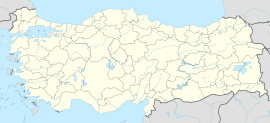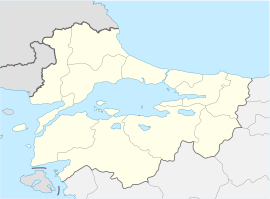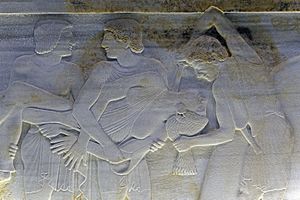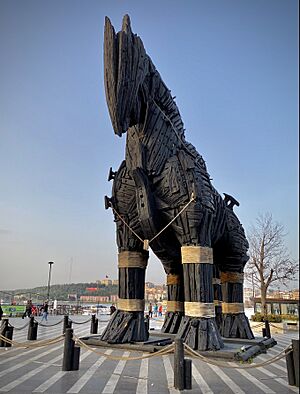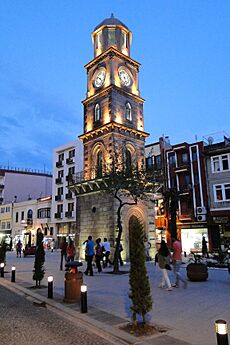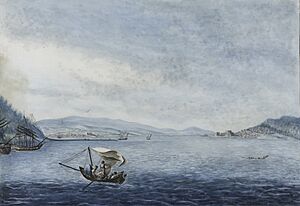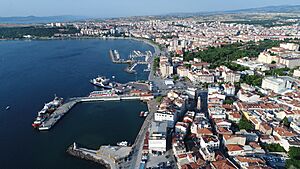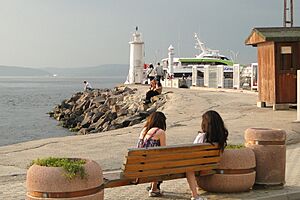Çanakkale facts for kids
Quick facts for kids
Çanakkale
|
||
|---|---|---|
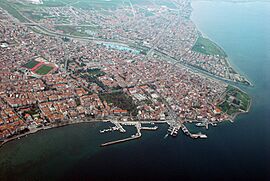
Aerial view of the city centre
|
||
|
||
| Country | Turkey | |
| Province | Çanakkale | |
| District | Çanakkale | |
| Elevation | 2 m (7 ft) | |
| Population
(2021)
|
143,622 | |
| Time zone | TRT (UTC+3) | |
| Postal code |
17000
|
|
| Area code | 0286 | |
Çanakkale is a lively city and port in Turkey. It sits on the southern side of the Dardanelles, a narrow waterway connecting seas. The city is the main town of Çanakkale Province. About 143,622 people lived there in 2021.
This city is very close to the ancient city of Troy. The famous wooden horse from the 2004 movie Troy is displayed right on the Çanakkale waterfront.
Today, Çanakkale is a popular starting point for visiting the ruins of Troy. It is also a key place for people visiting the First World War battlefields and cemeteries at Gallipoli. Many visitors come especially around March 18 and April 25 (ANZAC Day) to remember the war events.
Çanakkale has its own airport, just 3 kilometers from the city center. You can also travel to Çanakkale by intercity buses from cities like Bursa, Istanbul, and İzmir.
Contents
What's in a Name?
Çanakkale was first known as Ḳalʿa-i Sulṭānīye. This Ottoman name means "fortress of the sultan."
Later, in the late 1600s, the city became famous for its special glazed Çanakkale ceramics. A traveler named Richard Pococke compared them to Delftware. Because of this pottery, the city got a new name: Çanak Kalesi. This means "Pottery Castle." This name became official in 1890.
The ancient Greek-Byzantine name for this area was Dardanellia. This is where the English name Dardanelles comes from. Many visitors in the 1800s called the town Dardanelles. Around 1920, the British also started calling it 'Chanak' or 'Kale Sultanie'.
A Look Back: Çanakkale's History
Early Times and Ancient History
The first people lived in this area about 6,000 years ago. Not much is known about them. Early settlements were found at Kumtepe. Kumkale was likely built around 4000 BC, and Troy between 3500 and 3000 BC.
Greek people called Aeolians settled here in the 8th century BC. They quickly set up trading posts. Later, the Lydians and then the Persians took control of the region.
In 334 BC, Alexander the Great defeated the Persians. The area then became part of the Macedonian Empire. In the 2nd century BC, it was ruled by the Kingdom of Pergamon.
The western part of the Biga Peninsula, where ancient Troy is, was called Troas. Alexandria Troas was an important port during Roman times.
Ottoman Era
In the early 1300s, the Karasids controlled the Asian side of the strait. The Ottomans took over Gallipoli in 1367. In 1462, Sultan Mehmed II built the Kale-I Sultaniye fortress. This fort is where Çanakkale is today.
The Kale-I Sultaniye fort was built at the narrowest point of the Dardanelles. Along with the Kilitbahir fort on the other side, it helped control ships passing through the strait. These two forts were called "The Castles." A town grew around the Kale-I Sultaniye fort.
From the late 1400s, Jewish families who were forced to leave Spain settled in Çanakkale. They became a large community. They helped supply ships and worked as agents for European countries. By 1890, about 1,805 Jewish people lived there. The total population was 10,862, including Muslims, Greeks, Armenians, and other foreigners.
Twentieth Century
In 1915, during the First World War, Britain and France tried to take control of the Dardanelles. They hoped to capture Constantinople (now Istanbul). This conflict is known as the Gallipoli Campaign in the West. In Turkey, it is called the Battle of Çanakkale (Çanakkale Savaşı).
In March 1915, the Royal Navy tried to force their way through the Dardanelles but lost many ships. Several battleships, including HMS Triumph and Bouvet, were sunk. Submarines like the French Joule and the Australian AE2 were also destroyed. Most of the damage came from mines.
By 1920, Çanakkale had about 22,000 people. It was a busy port where ships stopped while traveling through the strait. Goods like wine, animal hides, and grain were shipped from here.
Things to See and Do
In Çanakkale City
The old Kale-i Sultaniye fort is now called Çimenlik Kalesi. You can visit it as a military museum and art gallery. It also has a copy of the mine-laying ship Nusret.
A clock tower from the late 1800s marks the older part of town. Here, narrow streets are full of cafes and hotels. There is also a new Kent Müzesi (City Museum). It shows the recent history of the town. The old archaeology museum's items are now at the new Troy Museum.
The most popular spot in the evenings is the wide waterfront. Here, you can see the wooden horse from the film Troy. Many cafes and restaurants line the waterfront, offering great views of the Dardanelles.
Around Çanakkale
Regular ferries travel between Çanakkale and Kilitbahir. You can visit the second castle there, which also guarded the Dardanelles.
Tour companies in Çanakkale offer trips to the Gallipoli Battlefields and Troy. You can easily reach Troy by minibus from Çanakkale. Exploring the battlefields is easier with a car or a guided tour.
In summer, you can also take a ferry from Çanakkale to Gökçeada. This is one of two inhabited Aegean islands belonging to Turkey. In winter, bad weather might stop the ferries.
Çanakkale Ceramics
From the 1600s, Çanakkale had a busy ceramics industry. Its pottery became more popular as other centers declined. The pottery was simpler than others, and by the late 1800s, much of it was made for tourists.
For a long time, people didn't think much of Çanakkale pottery. Its animal and plant-shaped pots were seen as a bit clumsy. However, these unique pieces are now very popular with collectors.
Weather in Çanakkale
Çanakkale has a Mediterranean climate. This means it has hot, dry summers and cool, wet winters. Winds are strong all year, especially in winter.
The highest temperature ever recorded was 39.7°C (103.5°F) on August 1, 2021. The lowest temperature ever recorded was -11.5°C (11.3°F) on February 2, 1929.
| Climate data for Çanakkale (1991–2020, extremes 1929–2023) | |||||||||||||
|---|---|---|---|---|---|---|---|---|---|---|---|---|---|
| Month | Jan | Feb | Mar | Apr | May | Jun | Jul | Aug | Sep | Oct | Nov | Dec | Year |
| Record high °C (°F) | 20.6 (69.1) |
21.3 (70.3) |
27.3 (81.1) |
30.8 (87.4) |
38.9 (102.0) |
38.5 (101.3) |
39.2 (102.6) |
39.7 (103.5) |
35.9 (96.6) |
31.8 (89.2) |
27.7 (81.9) |
22.9 (73.2) |
39.7 (103.5) |
| Mean daily maximum °C (°F) | 9.8 (49.6) |
10.5 (50.9) |
13.1 (55.6) |
17.4 (63.3) |
23.0 (73.4) |
28.4 (83.1) |
31.4 (88.5) |
31.5 (88.7) |
26.7 (80.1) |
21.1 (70.0) |
16.1 (61.0) |
11.5 (52.7) |
20.0 (68.0) |
| Daily mean °C (°F) | 6.5 (43.7) |
7.0 (44.6) |
9.1 (48.4) |
12.8 (55.0) |
18.0 (64.4) |
22.9 (73.2) |
25.8 (78.4) |
26.0 (78.8) |
21.6 (70.9) |
16.8 (62.2) |
12.3 (54.1) |
8.3 (46.9) |
15.6 (60.1) |
| Mean daily minimum °C (°F) | 3.6 (38.5) |
4.0 (39.2) |
5.7 (42.3) |
9.0 (48.2) |
13.7 (56.7) |
17.9 (64.2) |
20.8 (69.4) |
21.2 (70.2) |
17.1 (62.8) |
13.1 (55.6) |
8.9 (48.0) |
5.5 (41.9) |
11.7 (53.1) |
| Record low °C (°F) | −11.0 (12.2) |
−11.5 (11.3) |
−8.5 (16.7) |
−1.6 (29.1) |
2.3 (36.1) |
6.6 (43.9) |
11.2 (52.2) |
9.4 (48.9) |
5.9 (42.6) |
0.4 (32.7) |
−7.0 (19.4) |
−10.5 (13.1) |
−11.5 (11.3) |
| Average precipitation mm (inches) | 78.6 (3.09) |
76.3 (3.00) |
66.0 (2.60) |
49.0 (1.93) |
32.1 (1.26) |
27.3 (1.07) |
12.9 (0.51) |
6.8 (0.27) |
24.2 (0.95) |
67.5 (2.66) |
79.2 (3.12) |
100.4 (3.95) |
620.3 (24.42) |
| Average precipitation days | 10.8 | 10.63 | 9.53 | 8.43 | 5.57 | 4.53 | 1.77 | 1.23 | 3.33 | 6.47 | 8.13 | 11.37 | 81.8 |
| Average snowy days | 2.09 | 2.3 | 0.61 | 0.04 | 0 | 0 | 0 | 0 | 0 | 0 | 0.22 | 1.35 | 6.61 |
| Average relative humidity (%) | 82.1 | 81 | 79.3 | 77.3 | 74.7 | 69.9 | 64.9 | 65.5 | 69.4 | 76.8 | 80.8 | 82.2 | 75.3 |
| Mean monthly sunshine hours | 93.0 | 118.7 | 164.3 | 207.0 | 272.8 | 309.0 | 341.0 | 322.4 | 249.0 | 179.8 | 117.0 | 86.8 | 2,460.8 |
| Mean daily sunshine hours | 3.0 | 4.2 | 5.3 | 6.9 | 8.8 | 10.3 | 11.0 | 10.4 | 8.3 | 5.8 | 3.9 | 2.8 | 6.7 |
| Source 1: Turkish State Meteorological Service | |||||||||||||
| Source 2: NCEI(humidity), Meteomanz | |||||||||||||
Learning and Education
Çanakkale has 13 high schools and a college. The Çanakkale Onsekiz Mart University is a big university here. It has many different departments and schools. More than 52,000 students attend this university. About 30% of the city's population are college graduates.
Famous People from Çanakkale
- Tevfik Rüştü Aras (Turkish foreign minister)
- Zeynep Bastık (singer)
- Nuri Bilge Ceylan (film director)
- Güney Dal (writer)
- Metin Erksan (film director)
- Onur Tuna (actor)
- Mustafa Tutkun (humanitarian activist)
Sister Cities
Çanakkale has special connections with other cities around the world. These are called sister cities:
See also
 In Spanish: Çanakkale para niños
In Spanish: Çanakkale para niños
 | Valerie Thomas |
 | Frederick McKinley Jones |
 | George Edward Alcorn Jr. |
 | Thomas Mensah |



